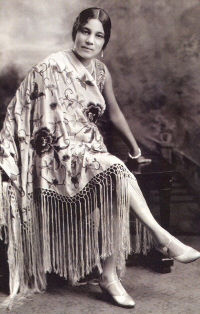Civil rights activist, ambassador of interracial goodwill, editor and publisher of the (Portland) Advocate, Oregon’s first African American female to practice law — Beatrice Morrow Cannady spent nearly 25 years working for equal rights for Oregon’s two thousand black citizens.
Born in 1889 in Littig, Texas, Cannady graduated from Wiley College in Marshall, Texas, in 1908. She continued her education at the University of Chicago, but left in 1912 for Portland where she married Edward Daniel Cannady and became editor of the Advocate. Her activities included writing for the weekly newspaper, lecturing to high school and college students, broadcasting during Negro History Week, and holding interracial, interreligious teas to educate whites about black history and eliminate stereotypes. Cannady protested showings of the controversial film The Birth of a Nation, kept readers informed of acts of terror committed by the Oregon Ku Klux Klan, worked to desegregate a school in Vernonia, Oregon, and filed a lawsuit against the Portland School Board for its practice of segregating swimming pools. She graduated from Portland’s Northwestern College of Law in 1922.
In 1929, the Portland Council of Churches nominated her for the Harmon Foundation’s annual award for Distinguished Achievement Among Negroes in the field of race relations. Although the honor went to Tuskegee Institute President Robert R. Moton, contemporaries called her an “outstanding citizen,” and a “leader among the people of her race.” Cannady continued to be active in Portland in the early 1930s, and ran unsuccessfully for the state legislature in 1932. At the end of 1936, she moved to Southern California where she spent the next four decades pursuing the things she was passionate about, though in a far less public way. She wrote for the (Perris, Calif.) Precinct Reporter, and held informal interracial gatherings – “fireside meetings” – at the Perris ranch she shared with her third husband. Cannady died in Los Angeles in 1974.

